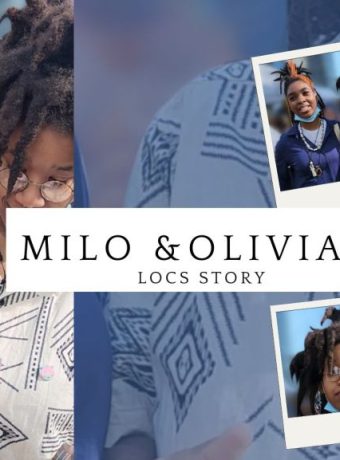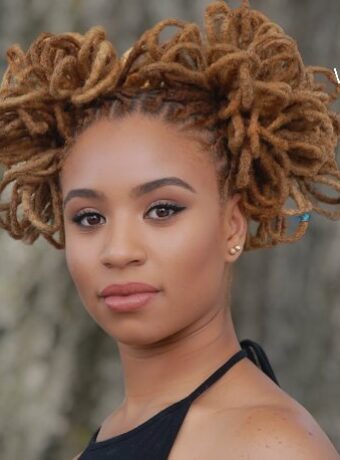admin@natural About Going Natural, Going Natural in the Press interview, magazine, clutch 0

By Mika Pettigrew
Drs. Mireille Liong-A-Kong On Going Natural
THURSDAY NOV 1, 2007 – BY MIKA PETTIGREW
 The concept of wearing ones natural hair may seem quite trivial, but that’s not always so. In the case of far too many black women it’s a grueling decision that can affect every aspect of her life and how she is perceived, whether or not she gets a promotion or even a job. A Glamour magazine ‘style expert’ recently referred to afros as a professional no-no. It’s no secret natural Black hairstyles are often viewed as un-kept, politically motivated or rebellious. But Clutch magazine celebrates natural hair and we’ve caught up with Drs. Mireille Liong–A-Kong, author of Going natural; How to Fall in Love with Nappy Hair?”, to discuss the hot topic. Miss Liong offers encouragement for those making the transition to natural hair, tips to maintain healthy hair, the Miss Nappturality: America’s Next Natural Model competition and much more.
The concept of wearing ones natural hair may seem quite trivial, but that’s not always so. In the case of far too many black women it’s a grueling decision that can affect every aspect of her life and how she is perceived, whether or not she gets a promotion or even a job. A Glamour magazine ‘style expert’ recently referred to afros as a professional no-no. It’s no secret natural Black hairstyles are often viewed as un-kept, politically motivated or rebellious. But Clutch magazine celebrates natural hair and we’ve caught up with Drs. Mireille Liong–A-Kong, author of Going natural; How to Fall in Love with Nappy Hair?”, to discuss the hot topic. Miss Liong offers encouragement for those making the transition to natural hair, tips to maintain healthy hair, the Miss Nappturality: America’s Next Natural Model competition and much more.
Clutch: Tell Clutch readers about your choice to go natural?
Drs. Mireille Liong-A-Kong: The short answer is my hair’s health I didn’t want to become bald. When my hair started breaking I thought it was my fault because hairdressers would always say something different. In fact I didn’t know much about hair or how you should care for it. All I knew was that at a certain age we had to relax our hair to keep it manageable and although I wasn’t against the look I never liked the process. I hated going to get my hair done. It took too much time and I couldn’t stand the burning.
Clutch: What inspired you to write Going natural; How to Fall in Love with Nappy Hair?”
Drs. Mireille Liong-A-Kong: My first book was doing well in The Netherlands but since I was living here I wanted to do an American version. There were dozens of books on natural hair in America already though but what was missing was a guide to make the transition. Hence, Going Natural; How to Fall in Love with Nappy Hair.
Clutch: What do you hope black women get from the book?
Drs. Mireille Liong-A-Kong: I really hope my book inspires women to go natural and that reading it is a guide to help them make the transition enjoyable.
Clutch: Can you share with Clutch magazine readers some of the best ways to maintain natural hair?
Drs. Mireille Liong-A-Kong: It’s pretty easy once you have the right tools and the right products that work for you. For tools I’d recommend a Denman brush. You may think they are expensive but they are worth their price. These brushes last at least a year and the needles are anti-static and easy on the kinks. The products you need are a non-stripping natural pH balanced shampoo, a good moisturizing deep conditioner and a moisturizer for maintenance. There are tons of good products but you have to learn to read the labels to know what’s in them and what works for you. The products I use are available in the napshop on my website
Obviously you should also know the basics like how to comb your hair, never do this when it’s dry and it’s best to untangle in the shower with a conditioner. I don’t want to rewrite my book right now so you can read more of the basics and a lot more if you order it.
Clutch: What sort of responses did you receive once you returned to natural hair?
Drs. Mireille Liong-A-Kong: I have only been able to become who I am because I am blessed with a great family who allows me to be myself. They never said anything bad or negative. In fact I think my brother was my early inspiration. When he was in his teens he came home one day with extensions to look like the tennis player Yannic Noa. Coworkers were no problem either. I was working in IT, flew all over the world from Japan to Germany with Bantus and all and never heard a bad word.
 Clutch: Did you have any particular feelings associated with responses you received?
Clutch: Did you have any particular feelings associated with responses you received?
Drs. Mireille Liong-A-Kong: Not really. I was more like a sponge because I wanted to absorb the responses. We were not raised with the idea of bad hair and I couldn’t really believe that people had such negative feelings about natural hair. So I had to grasp it and really wanted to see the responses for what they were so I could place them someday somehow.
Maybe I was also trained because when I was about the age of 12 a girlfriend looked at my afro and said I would commit suicide if I had hair like you. People find it hard to believe that it didn’t hurt me one bit. It stuck with me because I can remember her expression. She was looking for something hurtful to say to me and looked at me from toe to tip and found my fro. Unfortunately for her, it wasn’t my weak spot. My fro I tell you was always a mess and I was always fighting with it but I loved my hair for what it was. It was my hair and if you didn’t like it it was fine with me too. She had kind of half long weavy black hair. Nice, really nice. Just like my hair was really nice.
Clutch: In your opinion, is natural hair a political statement or birthright? And why?
Drs. Mireille Liong-A-Kong: Excellent question. It’s confusing because black hair and history go together and the biggest example that people have in mind is the afro and the Civil Rights Movement of the 60’s. That’s why people mistake black hair styles with political statements but natural hair is a birth right! For all people. We are the only people on planet earth who need to go to court to wear our hair natural. It’s outrageous! The arguments clearly proof that our hair is judged without knowledge when Bantus are compared to a Punk hairstyle. Punk styles are indeed to make a statement and they use all kinds of stuff to keep their hair up. Our hair does that naturally and we wear or hair in braids, Bantus, locs etc. What other race makes a statement when they wear their hair natural?
Clutch: Why is ‘natural hair’ important?
Drs. Mireille Liong-A-Kong: Well it’s certainly not because I think that everybody should go back to their roots or that sort of reason. It’s important because our hair’s health is at stake. We are chemically manipulating ourselves and we are in denial about it. 73%, think about it 73% (!) of our women suffer from hair damage due to the use of chemicals and we act like nothing is wrong. If we continue like this soon our babies will be born with even lesser hair than white babies and we won’t even have hair to sew a weave on.
Clutch: What are some of the obstacles for women attempting to go natural? Any suggestions for getting around these obstacles?
Drs. Mireille Liong-A-Kong: I think the biggest obstacle is really a mental one. Women are truly sensitive when it comes to family’s and friend’s attitude. My advice: Don’t worry they’ll come around when you do. It’s also easy to slide back when one’s hair is not doing what one expects it to do. That’s why patience is another huge obstacle. In my book I cover more obstacles and advice to help make the mental transition.
Clutch: Tell Clutch readers about Miss Nappturality; America’s Next Natural Model competition and how they can join in the competition.
Drs. Mireille Liong-A-Kong: Ten selected models will compete for teen weeks for the title online via www.going-natural.com. This website will provide each contestant with personal web-space to express herself throughout ten challenges. Weekly votes from a jury and members will determine who becomes the new face of Eden Body works and America’s Next Natural Model and receive a free year supply of Eden Body Works and much more.
Clutch: What words of encouragement can you share with Clutch magazine readers that are considering or in the process of going natural?
Drs. Mireille Liong-A-Kong: Be original, Do you.
http://clutchmagonline.com/beauty/drs-mireille-liong-a-kong-on-going-natural/#comments



